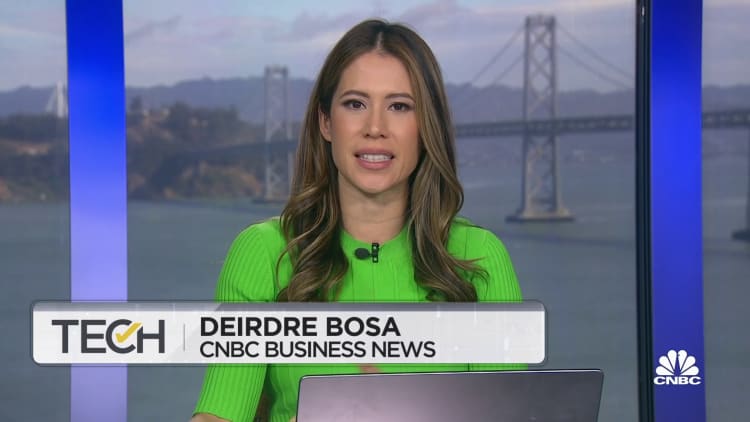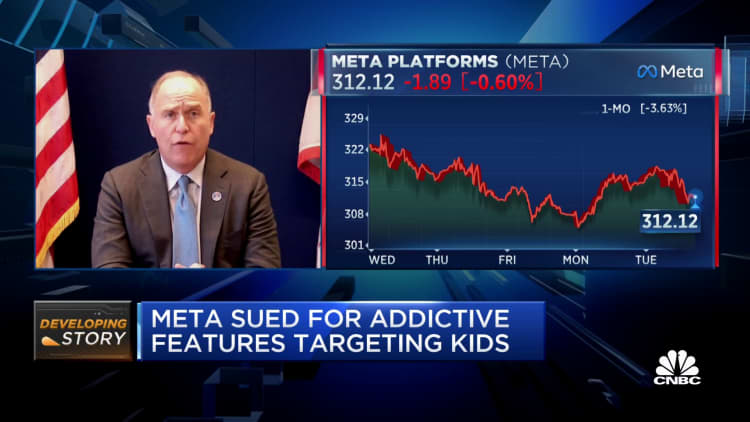
Meta reported earnings after the bell. Here are the results.
- Earnings: $4.39 per share vs $3.63 per share expected by LSEG, formerly known as Refinitiv.
- Revenue: $34.15 billion vs $33.56 billion expected by LSEG.
Investors will also be focused on user numbers:
- Daily active users (DAUs): 2.09 billion vs 2.07 billion expected, according to StreetAccount
- Monthly active users (MAUs): 3.05 billion vs 3.05 billion expected, according to StreetAccount
- Average revenue per user (ARPU): $11.05 expected, according to StreetAccount
Following a brutal 2022 for Meta, during which year-over-year ad revenue shrank for three consecutive quarters, growth is finally returning. The company is expected to show growth of 21% in the third quarter after sales increased 11% in the prior period.
So far in 2023, Meta has weathered the challenging digital advertising market better than smaller social media rivals like Snap, X (formerly known as Twitter) and Pinterest. Meta’s stock price has jumped about 160% this year after plunging by almost two-thirds in 2022.
Along with its ad-based competitors, Meta is still trying to recover from Apple’s 2021 iOS privacy update, which made it more difficult for companies to track users across the internet, hurting their online advertising businesses.
Meta appears to be the furthest along in terms of improving the effectiveness of its online ad platform following Apple’s changes. The company has pointed to its hefty investments in artificial intelligence as a key technology that’s helped Meta land retailers looking to serve customers targeted promotions.
But Meta’s continuing turnaround faces multiple hurdles. In particular, on Tuesday a bipartisan group of 42 attorneys general sued the company over allegations that its products harm the mental well-being of children and teenagers.
Susan Li, Meta’s chief financial officer, said last quarter that the company continues “to see increasing legal and regulatory headwinds in the EU and the U.S. that could significantly impact our business and our financial results.” Newly enacted legislation called the Digital Services Act from the European Commission, the executive body of the EU, could result in fines totaling as much as 6% of annual sales.
Meta, X and others must adhere to the DSA by removing illegal content and detailing how they’re doing it. That’s a point the European Commission recently reiterated due to the deluge of misinformation and violent content that’s been spreading tied to the escalation of the Middle East conflict.
Investors are also concerned that the Israel-Hamas war could lead to another pullback in advertising spending, similar to how businesses froze some promotions after Russia invaded Ukraine.
Snap said in its third-quarter earnings report that it has “observed pauses in spending from a large number of primarily brand-oriented advertising campaigns immediately following the onset of the war in the Middle East.”
Another persistent challenge for Meta is the amount of money it’s burning to build out the metaverse, which CEO Mark Zuckerberg has said will be the company’s future. Reality Labs, the division that houses the company’s virtual reality headsets and metaverse software, has lost more than $21 billion since the start of last year, and analysts are expecting an operating loss in the third quarter of $3.9 billion.
WATCH: Attorney generals around the country file lawsuit against Meta over addictive features.

CORRECTION: This story has been updated to reflect that Refinitiv is now known as LSEG. A previous version of this story misspelled the company name.

